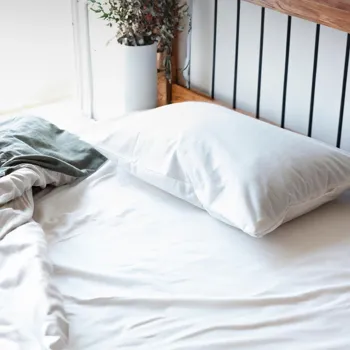Discover how proper sleep hygiene can transform your life. Learn 10 tips for better rest in a busy world
In today's fast-paced world, many Indians are finding it hard to get a good night's sleep. From demanding
work schedules to the constant stimulation of smartphones, several factors contribute to sleep deprivation.

This lack of sleep can affect our physical and mental health, making it difficult to focus, manage stress, and maintain a healthy lifestyle.
In this article, we'll explore the importance of sleep hygiene and provide 10 practical tips to help you improve your sleep quality and wake up feeling refreshed.
Sleep hygiene promotes restful sleep and overall well-being
Sleep hygiene refers to the habits and practices that promote consistent and restful sleep. It's about creating an environment and routine that signal to your body that it's time to sleep.

Good sleep hygiene can help you fall asleep more easily, stay asleep throughout the night, and wake up feeling more energetic. Neglecting sleep hygiene can lead to various problems, including insomnia, fatigue, mood swings, and decreased cognitive function.
Therefore, understanding and implementing good sleep habits is crucial for overall well-being.
Maintain regular sleep schedule and create a relaxing night routine
First, it is very important to maintain regular sleep schedule. Try to sleep and wake up same time every day, even during weekends as it helps regulate the body's internal clock, known as the circadian rhythm. This can make it easier to fall asleep and wake up at consistent times.

Second, create a relaxing night routine. Before bed, do relaxing activities like reading, taking a bath, or gentle movements. Avoid screen time (phones, tablets, computers) at least an hour before bed, as the blue light emitted from these devices can interfere with sleep.
Create a sleep-friendly place. Make sure your room is dark, quiet, and cool. Use blackout curtains, earplugs or a white noise machine to block out distractions. A comfortable mattress and pillows are also essential for good sleep.
Maintain sleep hygiene by watching diet, exercise, and stress levels
Next, it is important to watch what you eat and drink before bed. Avoid large meals, caffeine, and alcohol close to bedtime. These substances can disrupt your sleep and make it harder to fall asleep. Drink herbal tea for relaxation. Engage in regular physical activity.

Regular exercise can improve your sleep quality. However, avoid intense workouts close to bedtime. Aim to finish your workouts at least a few hours before you go to sleep. Also, manage your stress.
Find healthy ways to cope with stress, such as meditation, deep breathing exercises, or spending time in nature. High stress levels can make it difficult to fall asleep.
Limit daytime naps to 30 minutes; avoid late naps
Furthermore, it's key to limit daytime naps. If you nap, try to keep them short of about 30 minutes and avoid napping late in the day. Avoid late naps during the day. Use your bed only for sleep and intimacy. Avoid working, watching TV, or reading in bed.

This will help your brain associate your bed with sleep. Consider a professional treatment, if you are having some sleep disorders. If you have persistent sleep problems, such as difficulty falling asleep or snoring, consult a doctor or sleep specialist.
Good sleep hygiene is crucial for health and well-being
Good sleep hygiene is essential for maintaining physical and mental health. By following these tips, you can create a sleep-friendly environment and routine that promotes restful sleep.

Start incorporating these practices into your daily life, and you will start seeing the benefits of improved sleep quality. A good night's sleep can make a big difference in your overall well-being. Remember, investing in your sleep is an investment in your health and happiness.
Sleep deprivation harms health long-term; prioritize quality sleep
Sleep deprivation isn't just about feeling tired; it impacts your health long-term. Lack of sleep weakens your immune system, making you more prone to infections. It messes with your metabolism, increasing the risk of diabetes and weight gain.

Your heart suffers too, leading to higher blood pressure and heart problems. Mentally, sleep deprivation can cause irritability, difficulty concentrating, and even depression. So, prioritize sleep, and protect your overall health.
Consistent sleep schedule crucial for better sleep
Creating a consistent sleep schedule is paramount. Aim to go to bed and wake up around the same time every day, even on weekends. This helps regulate your body's natural sleep-wake cycle. A regular sleep schedule stabilizes your circadian rhythm. It helps you fall asleep and wake up more easily.

Over time, your body will naturally adjust, making it easier to get the restful sleep you need.
AI Generated Content. Glance/InMobi shall have no liability for the content












